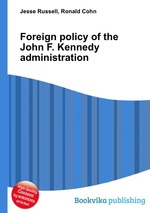Foreign policy of the John F. Kennedy administration
Jesse Russell Ronald Cohn
бумажная книга
High Quality Content by WIKIPEDIA articles! The foreign policy of the John F. Kennedy administration in 1961–1963 saw diplomatic and military initiatives in Europe, Southeast Asia, Latin America and other regions amid considerable Cold War tensions. Kennedy deployed a new generation of foreign policy experts, dubbed "the best and the brightest". Several of them were from the foreign policy think tanks. Kennedy had been interested in the issues of war and peace since his youth. In the inaugural address Kennedy encapsulated his Cold War stance as following: "Let us never negotiate out of fear. But let us never fear to negotiate". Kennedy`s strategy of flexible response, managed by Robert McNamara, was aimed to reduce the possibility of war by miscalculation. Kennedy`s administration contributed to the peaceful resolution of the Cuban Missile Crisis and refrained from further escalation of the 1961 Berlin Crisis. In 1961 Kennedy initiated the creation of Peace Corps, Arms Control and Disarmament Agency and Alliance for Progress. On October 7, 1963 he signed the Partial Nuclear Test Ban Treaty, which was accepted by the Soviet Union and the United Kingdom.


